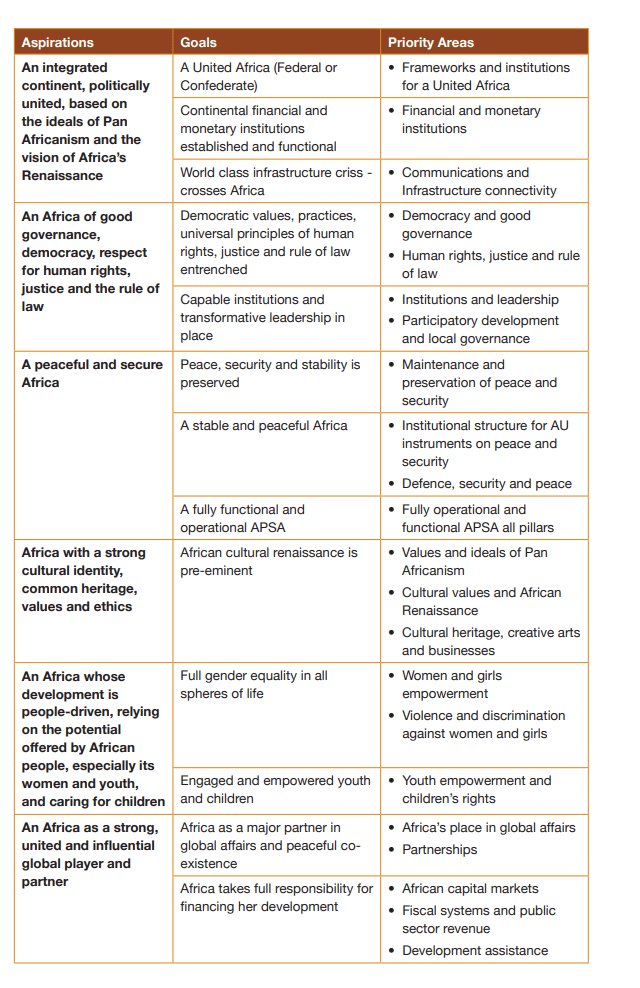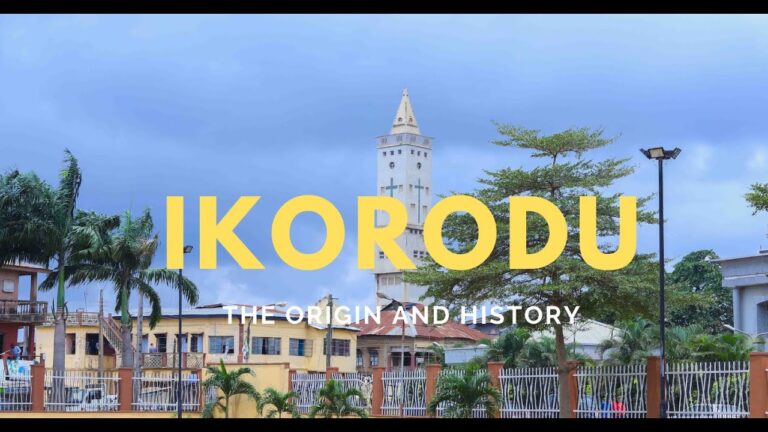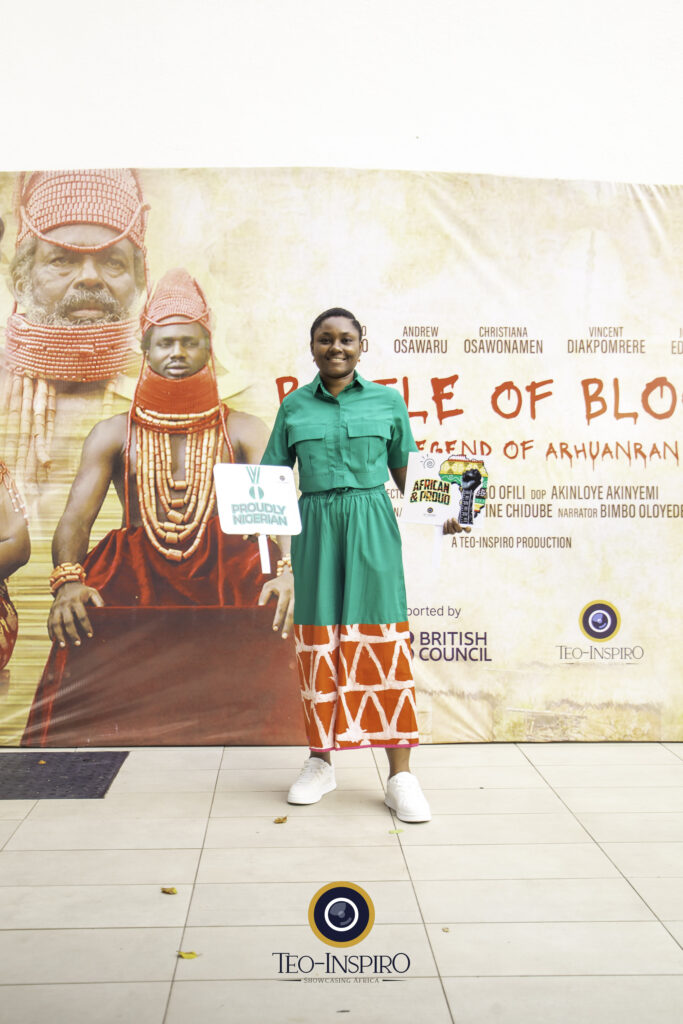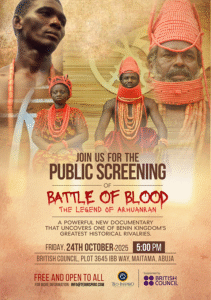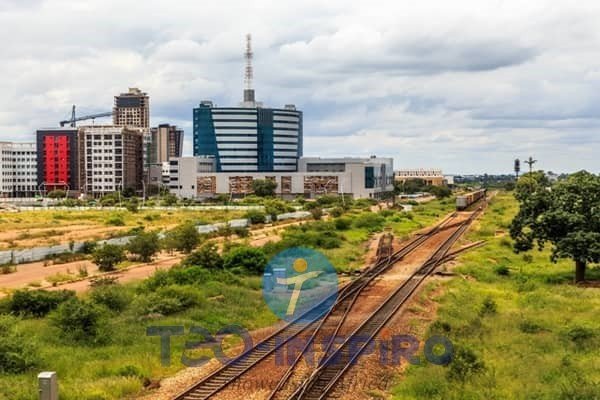Agenda 2063 is a document that describes the Africa we want by 2063. It paints a vivid picture of where Africans would like to see their continent 50 years from 2013, when Africa would be celebrating the centenary of the founding of the OAU. It is made up of 7 aspirations and 20 goals. Each goal has its priority areas outlined as a measure for monitoring and evaluation.
On the occasion of the Golden Jubilee of the OAU in May 2013, Africa’s political leadership acknowledged past achievements and challenges and rededicated itself to the Pan African vision of “an integrated, prosperous and peaceful Africa, driven by its own citizens and representing a dynamic force in the international arena.”
The Aspirations are linked to goals and each goal linked to certain priority areas which serve as measure to evaluate progress. The seven aspirations are:
- A prosperous Africa based on inclusive growth and sustainable development
- An integrated continent, politically united based on the ideals of Pan Africanism and the vision of Africa’s Renaissance
- An Africa of good governance, democracy, respect for human rights, justice and the rule of law
- A peaceful and secure Africa
- An Africa with a strong cultural identity, common heritage, values and ethics
- An Africa, whose development is people-driven, relying on the potential of African people, especially its women and youth, and caring for children and
- Africa as a strong, united, resilient and influential global player and partner

To ensure accountability and avoid having just another policy document signed by African Leaders, the aspirations are further broken down to steps (priority areas) that need to be taken in other to achieve these goals. The beauty of the implementation plan is that this has been designed to be implemented in five sets of 10-year strategic plans. What this means is that the 50-year plan has five documents that outlines what has to be achieve every ten years.
Attaining Agenda 2063 is largely dependent on strong political commitment, including accountable institutions and capacities to support implementation, monitoring and reporting of Africa’s 50-year development blueprint.
The Aspirations and Priority Areas Contained in Agenda2063
Today, I want us to focus on understanding the components of each aspiration and their priority areas. The First Ten-Year Implementation Plan of Agenda 2063, spanning 2014 to 2023, outlines a set of goals, priority areas and targets that the continent aims to achieve at national, regional and continental levels.
- A prosperous Africa based on inclusive growth and sustainable development: We aspire that by 2063, Africa shall be a prosperous continent, with the means and resources to drive its own development, with sustainable and long-term stewardship of its resources.
Priority Areas:
- A high standard of living, quality of life and wellbeing for all citizens
- Well educated citizens and skills revolution underpinned by science, technology and innovation
- Healthy and well-nourished citizens
- Transformed economies
- Modern agriculture for increased productivity and production
- Blue/ocean economy for accelerated economic growth and
- Environmentally sustainable and climate resilient economies and communities
- An integrated continent, politically united based on the ideals of Pan Africanism and the vision of Africa’s Renaissance
Priority Areas:
- Be a United Africa;
- Continental financial and monetary institutions established and functional
- Have world class, integrative infrastructure that crisscrosses’ the continent;
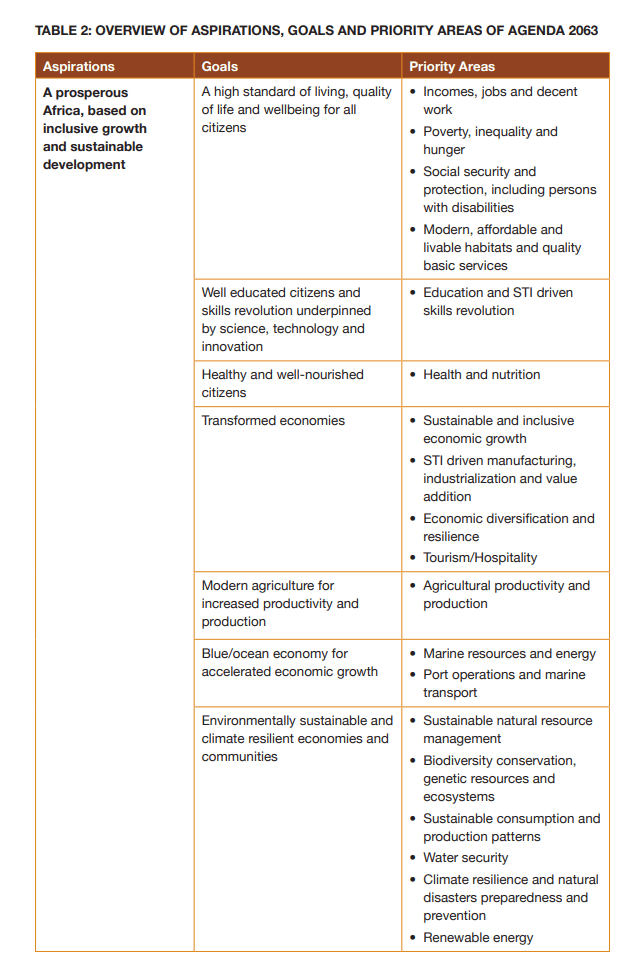
- An Africa of good governance, democracy, respect for human rights, justice and the rule of law
Priority Areas:
- Be a continent where democratic values, culture, practices, universal principles of human rights, gender equality, justice and the rule of law are entrenched; and
- Have capable institutions and transformative leadership in place at all levels.
- A peaceful and secure Africa:
Priority Areas:
- Peace, security and stability is preserved
- A stable and peaceful Africa
- A fully functional and operational African Peace and Security Architecture (APSA)
- An Africa with a strong cultural identity, common heritage, values and ethics
Priority Area:
African cultural renaissance is pre-eminent
- An Africa, whose development is people-driven, relying on the potential of African people, especially its women and youth, and caring for children.
Priority Areas:
- Full gender equality in all spheres of life
- Engaged and empowered youth and children
- Africa as a strong, united, resilient and influential global player and partner
Priority Areas:
- Africa as a major partner in global affairs and peaceful co-existence
- Africa takes full responsibility for financing her development
